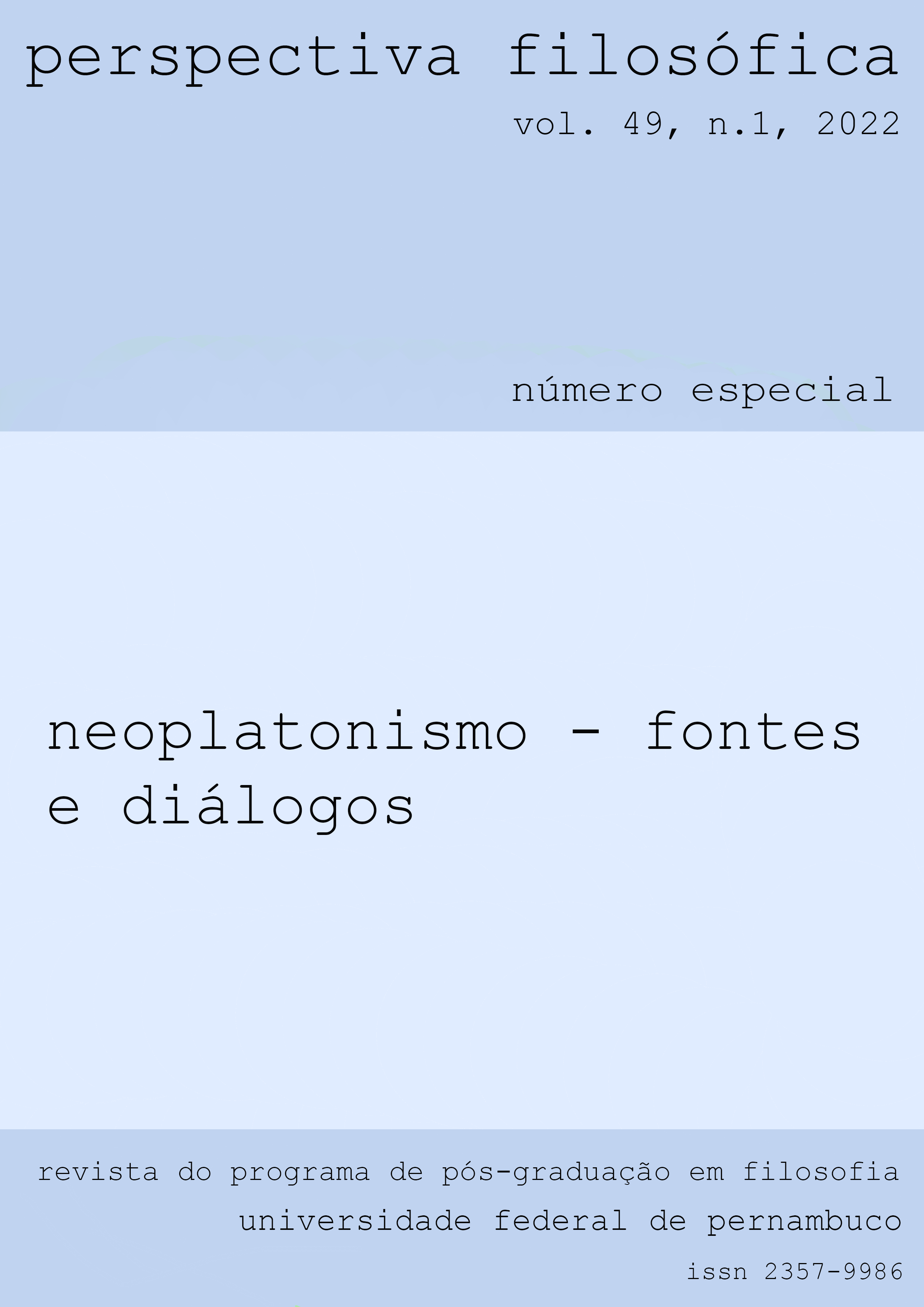Directio speculantis: the trinitarian problem by Nicholas of Cusa
DOI:
https://doi.org/10.51359/2357-9986.2022.253149Keywords:
Nicholas of Cusa, Neoplatonism, Theology, Trinity, HenologyAbstract
The paper explores Nicholas of Cusa’s Trinitarian theology, highlighting the underlying tension between the resumption of Proclus’ exegesis and the necessity to found the Trinitarian nature of the absolute principle. Rereading the theme of the docta ignorantia in the light of the nomina Dei of the non aliud and the possest, the analysis follows the progressive deepening of the problem in the development of the cardinal’s works, in order to show the impossibility of reconciling the Christian theology with the henological approach of Greek Neoplatonism, from which it follows the impossibility of resolving the aporias relating to the personality of the principle and to the relations between God and creatures.References
AGOSTINHO DE HIPONA. Epistula 130. Edição: Al. Goldbacher. Vindobonae - Lipsiae: Corpus Scriptorum Ecclesiasticorum Latinorum (44), 1904, p. 40-77.
AGOSTINHO DE HIPONA. De natura et origine animae. Edição: Carolus F. Urba et Josephus Zycha. Vindobonae – Lipsiae: Corpus Scriptorum Ecclesiasticorum Latinorum (60), 1913, p. 301-420.
ATANÁSIO DE ALEXANDRIA. Contra Arianos I. Edição: Karin Metzler. Berlin - New York: de Gruyter (Werke, II), 1998.
BASÍLIO DE CESAREIA. De Spiritu Sancto. Edição: Benoît Pruche. Lyon: Cerf (Sources Chrétiennes 17 bis), 19682.
BOAVENTURA DE BAGNOREGIO. Breviloquium. Edição: Frati Editori Quaracchi. Quaracchi: Bonaventurae Opera Theologica Selecta (V), 1964.
CHIARADONNA, Riccardo. Sostanza, movimento, analogia. Plotino critico di Aristotele. Napoli: Bibliopolis, 2002.
COSTANTINO IMP., “Epist. ad episc. et pleb”. (apud Gelas, H.E., II, 36, e Sokrat., H.E., I, 9). In: PORFÍRIO, Contra Christianos. Edição: Giuseppe Muscolino. Milano: Bompiani, 2009, p. 136-137.
CÜRSGEN, Dirk. Die Logik der Unendlichkeit: Die Philosophie des Absoluten im Spätwerk des Nikolaus von Kues. Frankfurt am Main: Peter Lang,
DANGELMAYR, Siegfried. Gotteserkenntnis und Gottesbegriff in den philosophischen Schriften des Nikolaus von Kues. Meisenheim am Glan: A. Hain, 1969.
DANTE ALIGHIERI, Purgatorio. Milano: Mondadori, 2016.
DUCLOW, Donald F. “The Analogy of the Word”. In: DUCLOW, Donald F. Masters of Learned Ignorance: Eriugena, Eckhart, Cusanus. Aldershot: Ashgate, 2006, p. 255-274.
GREGÓRIO DE NAZIANZO. Epistula 101. Edição: Paul Gallay. Lyon: Cerf (Sources Chrétiennes 208), 1974.
MAAS, Frans. "Divine omnipotence in the view of Nicholas of Cusa”. In: BOCKEN, Inigo (ed.), Conflict and Reconciliation: Perspectives on Nicholas of Cusa. Leiden: Brill, 2004, pp. 177-188.
MONACO, Davide. Deus Trinitas: Dio come non altro nel pensiero di Nicolò Cusano. Roma: Città Nuova, 2010.
NICOLAU DE CUSA. Opera omnia. Edição: Academiae Litterarum Heidelbergensis. Heidelberg, 1932-2010.
NICOLAU DE CUSA. Acerca de lo no-otro o de la definición que todo define. Edição: Jorge M. Machetta y Klaus Reinhardt. Buenos Aires: Biblos, 2008.
PLOTINO. Enneádes. Edição: Paul Henry e Hans-Rudolf Schwyzer. Oxford: Clarendon Press, 1964-1982.
SENGER, Hans Gerhard. “Die Präferenz für Ps. Dionysius bei Nicolaus Cusanus und seinem italienischen Umfeld”. In: BOIADJIEV, T︠S︡ocho, KAPRIEV, Georgi, SPEER, Andreas (eds.). Die Dionysius-Rezeption im Mittelalter. Turnhout: Brepols, 2000, p. 505-539.
STALLAMACH, Josef. Ineinfall der Gegensätze und Weisheit des Nichtwissens: Grundzüge der Philosophie des Nikolaus von Kues. Münster: Aschendorff, 1989.
TOMÁS DE AQUINO. Summa theologiae. Edição: Commissio Leonina. Romae: Editio Leonina (IV-XII), 1888-1906.
TOMÁS DE AQUINO. Quaestiones disputatae de veritate. Edição: Antoine Dondaine. Romae: Editori di san Tommaso (XII, 1-3), 1972-1976.
WYLLER, Egil A. “Zum Begriff “non aliud” bei Cusanus”. In: SANTINELLO, Giovanni (ed.), Cusano agli inizi del mondo moderno. Firenze: Sansoni, 1970, p. 419-443.
WYLLER, Egil A. Nicolaus Cusanus “De non-aliud” und Platons Dialog “Parmenides”. In: DÜRING, Klaus, KULLMANN, Wolfgang (eds.), Studia platonica. Amsterdam: John Benjamins, 1974, pp. 239-251.
WYLLER, Egil A. “Identität und Kontradiktion. Ein Weg zu Cusanus’ Unendlichkeitsidee”. Mitteilungen und Forschungsbeiträge der CusanusGesellschaft, 15, 1982, pp. 104-120.
Downloads
Published
Issue
Section
License
A Revista Perspectiva Filosófica orienta seus procedimentos de gestão de artigos conforme as diretrizes básicas formuladas pelo Conselho Nacional de Desenvolvimento Científico e Tecnológico (CNPq). http://www.cnpq.br/web/guest/diretrizesAutores que publicam nesta revista concordam com os seguintes termos:
Os autores mantém os direitos autorais e concedem à revista o direito de primeira publicação, sendo o trabalho simultaneamente licenciado sob https://creativecommons.org/licenses/by/4.0/deed.pt_BR que permite o compartilhamento do trabalho com reconhecimento da autoria e publicação inicial nesta revista.
Os autores têm autorização para assumir contratos adicionais separadamente, para distribuição não-exclusiva da versão do trabalho publicada nesta revista, com reconhecimento de autoria e publicação inicial nesta revista (Consultar http://opcit.eprints.org/oacitation-biblio.html).

Esta revista está licenciada com uma Licença Creative Commons Atribuição 4.0 Internacional.













